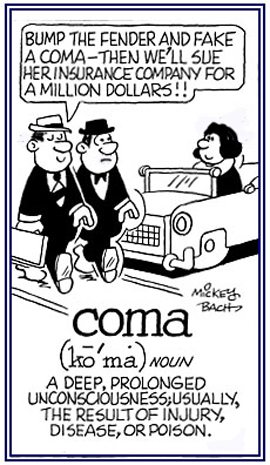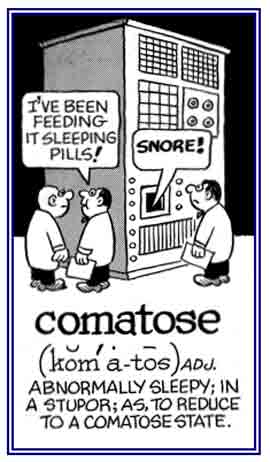coma-, -coma
(Greek: from Modern Latin which came from Greek koma, komatos, "deep sleep")
2. A prolonged situation of a deep sleep marked by the absence of normal eye movements and a lack of responses even to painful stimuli and the inability to speak: It is believed that more than 50% of comas are caused by trauma to the head or to circulatory accidents in the brain because of hypertension, arteriosclerosis, thrombosis, tumor, abscess formation, or insufficient blood flow to the brain.
3. Etymology: from Greek koma; genitive form, komatos, "deep sleep, lethargy"; which is probably related to kamnein, "to toil, to be sick" or "to be worn out, to suffer".
It may also be indirectly related to koimetr-, "sleeping".
An Extensive Explanation about Comas
As is often stated, a coma is a condition of unconsciousness and a lack of normal responses which is distinguishable from sleep in that the person does not respond to stimulants, such as shouting, shaking, or pinching, nor to his or her inner needs, such as emptying the bladder of urine.
A severe injury can cause immediate unconsciousness, which may last for only a few seconds or it may continue for weeks. When unconsciousness persists over a longer period, a person is commonly said to be "in a coma".
Comas are caused by disturbances or damages to areas of the brain involved in conscious activity or the maintenance of consciousness, especially in parts of the cerebrum (the main mass of the brain), the upper parts of the brain stem, and the central regions of the brain.
The damage may be the result of a head injury, or of an abnormality, such as a brain tumor, brain abscess, or intracerebral hemorrhage, all of which can be determined by brain imaging techniques.
Quite often, comas have been a result of buildups of poisonous substances which intoxicate brain tissues that are caused by drug overdoses, advanced liver or kidney diseases, acute alcoholic intoxications, or in uncontrolled diabetes mellitus (a chronic condition associated with abnormally high levels of sugar [glucose] in the blood and urine), or there may have been impairments of blood flow to some brain areas that lead to cerebral hypoxia (a lack of oxygen).
Encephalitis (inflammation of the brain) and meningitis (inflammation of the brain's protective coverings) can also cause comas.
Various depths of coma are recognized
In less severe forms, a person may respond to stimulation by saying a few words or perhaps by moving an arm or fingers.
In severe cases, the person fails to respond in this way to repeated vigorous stimuli; however, even deeply comatose patients may show some automatic responses, such as continuing to breathe unaided, may cough, yawn, blink, and show roving eye movements, indicating that the lower brain stem, which controls these responses, is still functioning to some degree.
Variations can be recorded by systems that classify the coma depending on the person's verbal behavior, the movements he or she makes, and the condition of the eyes (whether they are open, closed, or looking around).


Go to this Word A Day Revisited Index
so you can see more of Mickey Bach's cartoons.
2. Describing a condition in which a person is unable to react to anything that normally causes a physical reaction: Rob was comatose after having a bad head injury following the car accident and was not able to answer any of the doctor's questions.
3. Relating to a person unable to function or who is in a very tired or drunken state: Chemistry was not June's favorite subject which was required for her major in natural science, and she felt very comatose and quite drowsy after the one-hour lecture by the professor.
Stedman's Medical Dictionary, 28th edition, warns readers to "avoid the illegitimate form, comatosed".


